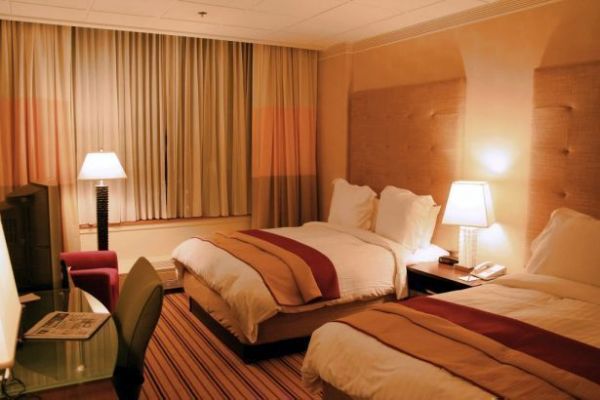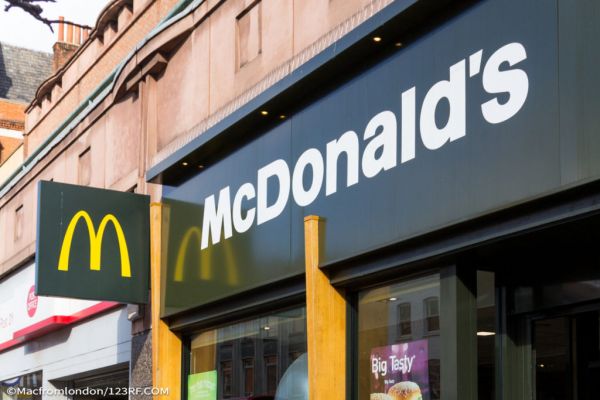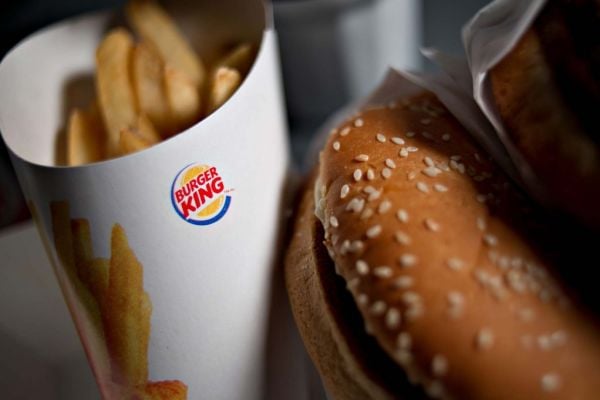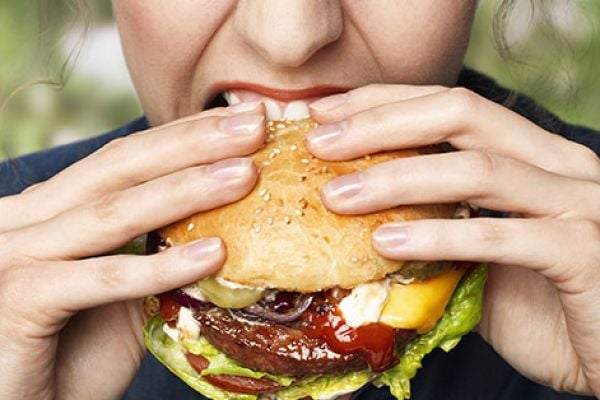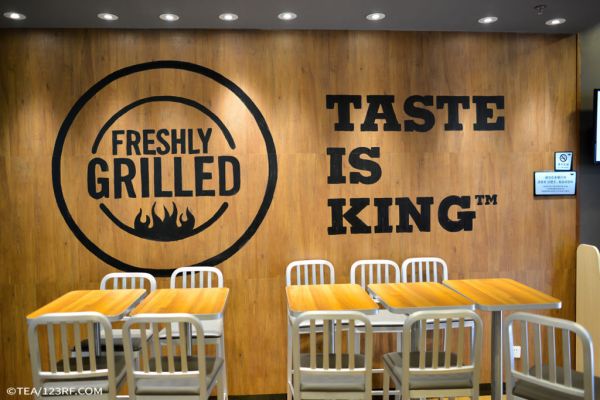Hospitality Ireland presents a round-up of global hospitality venue, food and drinks news.
Losses Deepen In Q3 For Saudi Pilgrimage Sites Developer
Third-quarter losses widened on the year for Jabal Omar Development Company, one of Saudi Arabia's largest listed property developers, as the pandemic impact lingered while it looks to restructure over $4 billion in liabilities.
The firm, which runs the Jabal Omar complex of hotels and property within walking distance of the Grand Mosque in the Muslim holy city of Mecca, was hit hard when the coronavirus outbreak reduced pilgrimages.
It reported a third-quarter net loss of 270 million riyals ($71.99 million), versus a loss of a 237 million a year earlier, it said in a statement on Thursday November 11.
It attributed the result to tax provisions and an increase in expenses after the expiry of pandemic-related waivers on some financial charges.
Revenue for the first nine months of this year was also slightly lower on the year.
"The stringent COVID-19 related restrictions on travel and tourism in the kingdom have had a severe impact on Makkah’s real estate, retail and hospitality sectors," said Chief Executive Khalid Al Amoudi.
"As such, our core operating assets continue to be severely impacted by low occupancy and footfall levels."
The company embarked on a plan this year to fix its heavily indebted balance sheet.
"We are currently in the middle of restructuring more than 15 billion riyals in liabilities, with the aim of decreasing our total liabilities and improving our liquidity by reducing our debt servicing levels by over 50%," said Chief Financial Officer Wael El Turk.
Jabal Omar is looking at an aggregate de-leveraging of three billion riyals by mid-2022.
"What we’re doing is seeking debt restructuring or some upsizing in some places and de-leveraging mainly in others in order to reach a better financial situation, but seeking new, fresh money is not in the plans now," El Turk told Reuters.
As part of its plan, Jabal Omar restructured a 4.7-billion-riyal loan last month, secured another of 1.6 billion riyals, guaranteed by the Saudi finance ministry, sold land, and delayed some debt repayments.
"We expect the majority of the programme to be completed by the first half of 2022, after which we will begin to see its positive impact reflected on our financial performance," Amoudi said.
Beyond Meat Shares Fall As Wall Street Appetite Fades On Forecast
Shares of Beyond Meat slumped 19% on Thursday November 11 after the faux meat maker signalled slowing demand at restaurants and grocers with a weak sales forecast, raising questions on whether its business is nearing saturation.
Sales of its plant-based meat fell at several fast-food chains in the third quarter, when the country was in the grip of Delta COVID-19 variant and restaurants were cutting hours and trimming menus to battle a labour shortage.
At least seven brokerages cut their price targets on the stock, with several analysts expecting the company to continue facing a slowdown. Beyond Meat on Wednesday forecast current-quarter revenue of $85 million to $110 million, well below estimates of $131.6 million.
"We view the results as further evidence that Beyond's business is reaching market saturation faster than expected and that the company has deeper problems that won't be easy to fix," Credit Suisse analyst Robert Moskow said.
"Consumer interest in Beyond is simply reaching a peak."
Three years back Beyond Meat's sales growth and stock were on a tear, as popular fast-food chains, including Tim Hortons and Yum Brands Inc's KFC, and several retailers tied up with company to sell its products.
That blistering pace of growth, however, has hit a speed bump, with the pandemic and the entry of newer players such as Impossible Foods into the market. Its stock is also down 24% for the year.
"With increased competition over the past two years, we're seeing, as expected, some impact on our market share," CEO Ethan Brown said on an earnings call.
He also said customers seemed less likely to try out newer products during the pandemic.
"Given the drop in revenues in Q3, a still-pressured Q4, revenue growth uncertainty in the near-term and into 2022 increases," Jefferies analyst Rob Dickerson said.
"This was the quarter that likely broke the camel's back."
Cyber Attack Turns Off The Taps At Barcelona's Damm Brewery
Spain's second biggest beer maker Damm halted output at its main brewery outside Barcelona after a cyber attack hit its computer systems earlier this week, a spokesperson said on Friday November 12.
The attack hit the brewery on Tuesday night and for a few hours the plant in El Prat de Llobregat, which produces 7 million hectolitres of beer a year, was "entirely paralyzed", Olga Vidal, Damm's head of communications, told Reuters on Friday.
"IT services made possible a partial resumption of production and we expect to operate at 100% in the coming hours," she said.
She declined to say whether a ransom was demanded of the company or if the maker of Estrella Damm lager had paid anything to the hackers behind the attack.
She wouldn't confirm whether the company had notified the police and local police declined to comment.
Damm bottles several other beer brands beside its iconic Estrella Damm and has honoured all deliveries to bars, restaurants and supermarkets thanks to existing stocks, Vidal said.
Several high-profile cyber attacks in the past year, including the Colonial Pipeline hack, which caused panic buying of fuel across the eastern U.S. in May, have jolted governments and companies into reviewing their security policies.
A European Union report released in October found the COVID-19 pandemic and rise of home working had created opportunities for cyber-criminals to flourish and led to a proliferation of so-called hackers for hire.
Last month, the Autonomous University of Barcelona was hit by a ransomware attack, while earlier this year hackers knocked out several services at Spain's employment agency.
Trump Reaches $375m Deal To Sell DC Hotel - WSJ
Former President Donald Trump's family hotel company has reached a deal to sell the rights to its Washington, D.C., hotel for $375 million, the Wall Street Journal reported on Sunday November 14, citing people familiar with the matter.
Miami-based investment firm CGI Merchant Group is in contract to acquire the lease, the newspaper said.
The Trump International Hotel is in a historic building a few blocks from the White House that the Trump Organization leases from the U.S. government. The hotel has been a popular gathering spot for Trump supporters and foreign dignitaries.
The newspaper said CGI intends to remove the Trump name and has reached an agreement with Hilton Worldwide Holdings to have the property managed and branded by Hilton's Waldorf Astoria group.
The Trump organization, CGI Merchant and Hilton did not immediately respond to Reuters requests for comment on Sunday November 14.
Last month, the U.S. House Committee on Oversight and Reform said newly obtained government documents raised "troubling" questions about the hotel.
According to the Democratic-controlled committee, Trump reported that the hotel earned him more than $150 million during his time in office but actually lost more than $70 million.
The committee found that the hotel received more than $3.7 million in payments from foreign governments - equal to more than 7,400 nights at the hotel, raising a potential conflict of interest.
The hotel is in the city's second-tallest structure, after the Washington Monument. The building previously housed the U.S. Post Office Department Headquarters.
With An Eye On The Stock Market, Italy's Illycaffe Picks New CEO
Illycaffe has chosen Cristina Scocchia, current boss of cosmetic company Kiko, to become chief executive at the start of next year as the Italian premium coffee maker gears up for a potential stock market listing.
The company controlled by the Illy family said that Scocchia would in January succeed current CEO Massimiliano Pogliani, who five years ago became the first non-family member to take charge of the group.
Under his leadership, Illycaffe completed the sale of a 20% stake to private equity firm Rhone Capital last February, opening up its capital to an external investor for the first time in its 88-year history.
"For the new growth cycle that will start in 2022 and in view of a future listing, we have chosen Cristina Scocchia, a manager recognised for her talent in developing brands with high aesthetic and experiential content," company Chairman Andrea Illy said.
Scocchia has been on Illycaffe's board since 2019 and is also a board director for glasses group EssilorLuxottica .
Illycaffe, which produces a blend made of nine varieties of arabica beans, was established by Andrea Illy's grandfather Francesco and was 100%-owned by the family's Illy Group holding company until February.
Andrea Illy told Reuters in February the coffee maker, based in the northeastern city of Trieste, could consider a bourse listing in the coming years, adding his family did not want to relinquish control even in the event of a stock market debut.
Tyson Foods Sales Rise As Meat Prices, Restaurant Demand Jump
Soaring meat prices helped Tyson Foods Inc overcome pandemic-related labour shortages at its plants as the top U.S. meat packer reported a stronger-than-expected quarterly profit on Monday November 15 and forecast improved revenue in the year ahead.
The Springdale, Arkansas-based company reported a double-digit jump in sales and earnings in the fiscal fourth-quarter ended Oct. 2, including a record quarter in its beef segment despite a 20% surge in cattle prices.
Tyson shares were up approximately 4% in midmorning trading on Monday November 15.
Rising meat prices and improving demand from restaurants have boosted U.S. meat companies including Tyson after the COVID-19 pandemic kept many diners at home last year. Meat packers have also seen record demand for American beef from China and amid diplomatic tensions between Beijing and supplier Australia.
Increased costs for labour, transportation and items such as feed grain and packaging have created headaches, however.
"Inflation has clearly had an impact on the business," said CEO Donnie King. "As rates of inflation continue, so will our pricing actions."
Top aides to U.S. President Joe Biden blamed Tyson and other large meat rivals that control much of the meat processing sector for rising food prices.
Tyson has rejected those assertions and instead blamed the pandemic and the U.S. labor shortage for limiting production.
The Jimmy Dean sausages maker said it was expecting sales of $49 billion to $51 billion for fiscal 2022, compared with market estimates of $47.99 billion, according to Refinitiv IBES.
Sales rose to $12.81 billion in the fourth quarter from $11.46 billion a year earlier. Analysts on average were expecting sales of $12.66 billion, according to Refinitiv IBES.
Net income attributable to Tyson increased to $1.36 billion, or $3.71 per share, from $654 million, or $1.79 per share, a year earlier.
Excluding one-off items, Tyson earned $2.30 per share, compared with estimates of $2.03.
Burger King Parent To Buy Firehouse Subs For $1bn As Other Brands Drag
Burger King-parent Restaurant Brands International Inc said on Monday November 15 that it would buy Firehouse Subs for $1 billion, at a time when its popular brands are struggling due to increased competition from rivals launching new menu items.
Analysts have said fried chicken sandwich pioneer Popeyes, owned by Restaurant Brands, has been hurt by McDonald's Corp and Yum Brands Inc's KFC launching similar items, while Burger King has underperformed in recent months on weak demand for its lower-priced menu items.
U.S. comparable sales at Burger King declined 1.6%, and slipped 4.5% at Popeyes in the third quarter ended Sept. 30.
Firehouse Subs, in comparison, reported U.S. same-store sales growth of 20% from pre-pandemic levels between January and October, Restaurant Brands said.
U.S.-listed shares of the company, which also owns Tim Hortons, rose marginally after it said the deal would immediately add to its earnings once it closes in the coming months. It also said it will fund the acquisition through cash on hand and debt.
"(We) have kept an eye on it (Firehouse Subs) from a distance over the years," Restaurant Brands Chief Executive Officer Jose Cil told Reuters.
Firehouse Subs' franchisees own and operate 97% of its 1,200 restaurants across 46 U.S. States, Canada and Puerto Rico. Restaurant Brands has about 27,000 stores in over 100 countries.
"There's a tonne of room for growth here in the U.S. and Canada, and all around the world," Cil said about Firehouse Subs, which is popular for its "Hook & Ladder" sub.
Firehouse Subs' loyalty program has 3.5 million subscribers, and is adding around 50,000 more customers per month, said Restaurant Brands, which earlier this year saw Burger King and Popeyes launch similar programmes.
Firehouse Subs Chief Executive Officer Don Fox and finance head Vincent Burchianti will manage its day-to-day operations.
Israel's Redefine Meat Serves Up Plant-Based Whole Cuts Of Beef
Israeli startup Redefine Meat on Tuesday November 16 expanded operations into Europe where it hopes to reach thousands of restaurants by the end of next year and served for the first time its plant-based whole cuts of alternative meat.
The 3D-printed beef substitute was rolled out in Israel, as well as Germany, the Netherlands and the United Kingdom. A mix of soy and pea protein, chickpeas, beetroot, nutritional yeasts and coconut fat, it mimics flank steak, which is also known as bavette.
The company, which until now worked with about 150 restaurants in Israel, said the whole cuts will broaden the appeal of alternative meat products that have mostly been limited to ground-beef dishes, including hamburgers and sausages.
"This is the money-maker. This is the reason we have meat," CEO Eshchar Ben-Shitrit said.
Their larger cuts of alternative meat are more complicated to produce and still evolving.
"We're scaling up the capacity. Every batch that we make is five times larger than the previous batch. So we're changing ... the machines, the flow and we're also changing the product attributes," he said.
The company plans to build five factories across Israel, Europe, the United States and Asia in the coming few years.
As technology advances and improves the taste and variety of alternative meats, sales in the sector could reach $140 billion by 2029, approximately 10% of the world meat market, Barclays estimates.
Competition is already high, with players including California's Beyond Meat and Impossible Foods and Spain's Novameat.
Redefine Meat previously announced it had secured $35 million in funds and said it has also raised a greater amount, but would not disclose how much.
"We raised the largest amount by far that an Israeli alternative meat company has ever raised," Ben-Shitrit said.
For perspective, earlier this year Israel's Aleph Farms, which is developing a method to cultivate meat in the lab from cow cells, raised $105 million.
Diageo Sees Double Digit Sales Growth In First Half, Shares Hit Record High
Drinks group Diageo on Tuesday November 16 said that it expects to grow organic net sales in the double digits in the first half of the year, based on increased brand investments and a rapid consumer shift towards high-end brands.
Shares of the world's largest spirits maker, part of the UK's blue-chip FTSE 100 index, rose as much as 3.4% to hit a record high of 3,948 pence in morning trading.
Issuing guidance ahead of its capital markets day, the Johnnie Walker whisky and Tanqueray gin maker said it expects organic net sales growth of at least 16% in the first half of its fiscal 2022 year ending June 30 and organic operating profit growth to be ahead of sales growth.
It also anticipates accelerating organic sales growth to between 5% and 7% in the fiscal 2023-2025 period, compared with the 4% to 6% growth during 2017-2019. It also sees growing earnings by up to 9% by the end of its fiscal 2025.
"While we expect inflationary pressures to increase, we also expect to benefit from operating leverage, premiumisation, revenue growth management and productivity gains," Chief Financial Officer Lavanya Chandrashekar said in a statement.
The pandemic has been a boon to Diageo as locked down consumers stocked up on alcohol and beers and traded up to more premium versions due to higher savings.
The company ended fiscal 2021 with one of the highest growth rates in its history, propelled by strong at-home demand in the United States and partly due to the re-opening of bars and restaurants in Europe where vaccination is more widespread.
Rival Pernod Ricard, known for Absolute vodka, also said that it expects strong growth in fiscal 2022, with a bit of moderation to what it had seen during the pandemic.
Wagamama Owner Lifts Outlook As Travel Hub Demand Improves, Shares Soar
Restaurant Group Plc raised its annual profit outlook on Tuesday November 16 as improved passenger traffic at UK airports led to an "outperformance" in like-for-like sales in the past two months, sending shares of the Wagamama owner soaring nearly 20%.
The company, which runs restaurant chains and grub kiosks in travel hubs, now expects core profit for the fiscal year ending Jan. 2 to be between £73 million and £79 million, as long as there are no unexpected COVID-related disruptions.
Restaurant Group posted a profit of £53.4 million last year. Shares of the company were leading gains on London's mid-cap FTSE 250 index and on course for their best day in just over a year.
The company said business had been good since mid-September, adding that its concessions division has benefited from an uptick in footfall at airports.
Last week, WH Smith, which sells books, stationery and snacks at travel hubs, predicted sales would be at pre-pandemic levels in the current fiscal year following a recovery in North America and Britain after pandemic curbs were relaxed.
Restaurant Group, which had shut over 250 restaurants and cut approximately 3,000 jobs during the pandemic, is emerging as a higher quality business due to its aggressive restructuring, Stifel analysts wrote in a note.
Heineken To Buy South Africa's Distell And Namibian Breweries
Dutch brewer Heineken said on Monday November 15 that it planned to take control of South Africa's Distell Group Holdings and Namibia Breweries Ltd to form a southern Africa drinks group worth €4 billion.
The takeover of Distell would mark a push into wine and spirits for the world's second-largest beer maker, with liqueur brand Amarula and wines labels Nederburg and Two Oceans. Heineken will sell Distell's British-based Scotch whiskies.
Heineken Chief Executive Dolf van den Brink said the deal would improve logistics and increase points of sale, often shared for beer, wine and spirits in South Africa, and would do the same in Namibia. It also offered growth in other African markets, such as Kenya and Tanzania, he said.
"It should not be seen that we now start to buy spirits and wine companies all over the world," Van den Brink told Reuters.
Heineken will pay €1.3 billion in cash and add its existing South African business, to secure at least 65% of the new business.
The deal will value Distell at about 40.1 billion rand ($2.6 billion) or 180 rand per share, Distell said, a discount of 1.4% to the stock's Friday close.
Heineken will take control of regional partner Namibian Breweries Ltd (NBL), with a current market valuation of about 400 million euros.
Heineken will buy the 50.01% interest of Ohlthaver & List Group of Companies in NBL Investment Holdings, which holds 59.4% of Namibia Breweries (NBL). Heineken holds the remaining 49.99% of the holding vehicle.
The transaction also entails Heineken's purchase of NBL's 25% shareholding in Heineken South Africa.
Van den Brink said the brewer expected cost and revenue synergies with benefits across production, logistics and procurement, but no job losses in the near term.
The overall transaction is expected to increase margins over the medium term and boost earnings per share within the first year after completion.
The takeovers would be the first major deal for Van den Brink, who took charge at Heineken in June 2020 and has launched a plan to restore profit margins, partly through cutting 8,000 jobs. Heineken did increase its stake to take full control of India's largest beer maker United Breweries Ltd in June.
Distell did not pay a dividend for the financial year ended June 30, as a condition for Heineken's takeover proposal.
Distell CEO Richard Rushton said the deal was likely to close by the end of December 2022 and shareholders would not be paid any interim or full-year dividend.
Distell shares were trading down 7% at 169.34 rand as investors were not enthused by the offer price.
"Heineken and Remgro (Distell's holding company) are the winners in this," said Richard Cheesman, senior analyst with hedge fund Protea Capital Management, which holds shares in Distell.
"It matters less to Remgro what price Heineken is paying as it will remain invested in the unlisted Newco (new company), but shareholders were expecting that Remgro's influence could have resulted in a higher offer."
Heineken's shares were up 0.9% at €98.22 at 1425 GMT on Monday November 15.
Amazon's Healthcare Business Has Landed Hilton As A Key Customer
Amazon.com Inc has reached a deal to sell virtual medical services to Hilton in the United States, landing a marquee customer for its nascent healthcare business.
The company declined to disclose financial terms of its agreement with the hotel chain.
The world's biggest online retailer has looked to sign up employers to Amazon Care, its on-demand health offering that lets users message or video-chat clinicians and receive home visits in some cities. Amazon piloted the service for its employees around Seattle in 2019, and this summer it started marketing Care nationwide to other companies.
The deal with Hilton Worldwide Holdings Inc, which Reuters is first to report, marks Amazon Care's first hospitality customer and only its second disclosed client after fitness equipment maker Precor. It shows how the company is seeking to disrupt the healthcare industry with a tried-and-true playbook.
Just as Amazon built data centers to satisfy its e-commerce needs and later sold access to this infrastructure in what became its cloud-computing business, so is Amazon looking to market a healthcare service it built first for its workers' benefit.
Speaking at Reuters' Total Health conference on Monday November 15, Kristen Helton, director of Amazon Care, called the Hilton deal "a great step forward for the business to show we can provide care nationwide to their team members."
Hilton employed about 141,000 people globally as of Dec. 31, 2020. All its U.S. staff enrolled in a corporate health plan will have Amazon Care as a benefit next year.
That means virtual meetings with clinicians from Care Medical, a company focused on serving Amazon Care users. Amazon also offers house calls in greater Seattle and the Washington-Baltimore metro area, with plans to expand to Los Angeles, Chicago, Dallas, Philadelphia and Boston.
Helton said employers' pandemic safety concerns and recruiting needs during a labor shortage have contributed to demand.
"Attracting and retaining talent is so critical for businesses right now," she said.
Hilton pays for workers' access to care and for a portion of the visit expenses. Text chats via Amazon Care will be free to the hotel chain's employees, while provider video or home visits carry a small fee, she said.
Artificial intelligence (AI) will play a greater role in the future, too.
"We will have clinicians in the loop for a period of time until we can actually trust that AI and those technology solutions are taking care of the patient in the way that is best," Helton said.
Amazon is looking to technology to reduce providers' post-care work and lower costs, though the human connection remains very important, she said.
News by Reuters, edited by Hospitality Ireland. Click subscribe to sign up for the Hospitality Ireland print edition.
